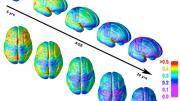As the Future Catches You: How Genomics and Other Forces Are Changing Your Life, Work, Health, and Wealth, by Juan Enriquez '81, M.B.A. '86, IAF '97, director of the Life Sciences Project at Harvard Business School (Crown Business, $23). With clarity and zest, Enriquez tells what the genetic, digital, and knowledge revolutions will do to our lives. His book zooms along. The text quoted below, for instance, is set in four type styles and is spread across half a page. "The dominant language...and economic driver...of this century...is going to be GENETICS. Those who remain illiterate in this language...Won't understand the force making the single biggest difference in their lives. Many countries and companies just don't get it."
Making Babies, Making Families: What Matters Most in an Age of Reproductive Technologies, Surrogacy, Adoption, and Same-Sex and Unwed Parents, by Mary Lyndon Shanley, Ph.D. '72 (Beacon Press, $27). The new ways we've hatched of creating families have raised a brood of emotion-charged questions. The Halleck professor of political science at Vassar proposes ethical principles to guide family law and policy in addressing them.
The Limits of Humanitarian Intervention: Genocide in Rwanda, by Alan J. Kuperman '85 (Brookings Institution Press, $38.95, cloth; $16.95, paper). To mitigate in the future such large-scale killing as the slaughter of a half-million Tutsis in three months in 1994, writes Kuperman, a fellow at the University of Southern California's Center for International Studies, Western governments need better intelligence, to detect such emergencies before the outbreak of violence, and greater ability to deploy troops fast.
The Good Men: A Novel of Heresy, by Charmaine Craig '93 (Riverhead Books, $24.95). Studying medieval history at Harvard and fascinated by the split in Western culture between the spirit and the flesh, Craig read the startling testimony of Grazida Lizier, a young woman tried for heresy by the Inquisition in 1320. She couldn't forget Grazida's story and bases this powerful first novel on it.
Gilligan Unbound: Pop Culture in the Age of Globalization, by Paul A. Cantor '66, Ph.D. '71 (Rowman & Littlefield, $27.95). A Shakespearean scholar and professor of English at the University of Virginia explains that the Simpsons are actually defending the nuclear family and reminds us that with American optimism, Star Trek made the entire galaxy safe for democracy. "An innovative book bursting with wit, a treat for the mind," opines Harvey Mansfield, Kenan professor of government, on the dust jacket. "It may make you believe that watching TV is not a total waste of time."
In the Floyd Archives: A Psycho-bestiary, by Sarah Boxer '80 (Pantheon, $15, paper). Boxer's day job is reporter and critic for the New York Times, but she published her first cartoon when she was 11 and began reading Freud at 15. In her first book, she puts an appealing menagerie on the couch. The psychoanalytically hip will have no trouble recognizing certain of Dr. Freud's patients in Dr. Floyd's: paranoid Mr. Bunnyman, who is being chased by Mr. Wolfman (a cross-dresser with an hysterical female alter ego named Lambskin), and Rat Ma'am, an obsessive-compulsive pack rat who likes being spanked.
The People's Emperor: Democracy and the Japanese Monarch, 1945-1995, by Kenneth J. Ruoff '88 (Harvard University Asia Center, distributed by Harvard University Press, $45). A monograph presenting the first detailed study in English of the monarchy in postwar Japan. It remains important. H.I.H. Crown Princess Masako '85, on December 1, presented the nation with a baby girl who might one day be empress.
Calhamer on Diplomacy: The Boardgame "Diplomacy" and Diplomatic History, by Allan B. Calhamer '53 (1stBooks Library, www.1stbooks.com; $10.95, paper; $4.95 in electronic format). The durable geopolitical strategy boardgame "Diplomacy" debuted in 1954, and players wishing to rule one of the seven Great Powers of 1914 Europe, formulate its policies, and stab its neighbors in the back have been playing the game with gusto ever since. Here its inventor discusses "Diplomacy" and various of its relations to actual diplomatic history.
An Affair of Honor: A Novel, by Richard Marius (Knopf, $26.95). The author ran the Expository Writing Program at Harvard from 1978 to 1998 and was a longtime contributor to this magazine. Before his death in 1999, he completed the third of a trilogy of novels set in fictional Bourbon County, Tennessee. It was published in the fall.




